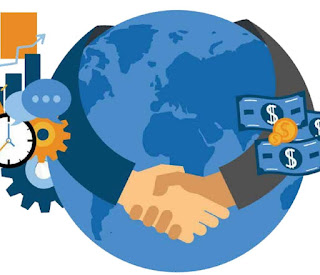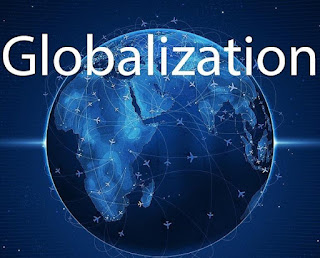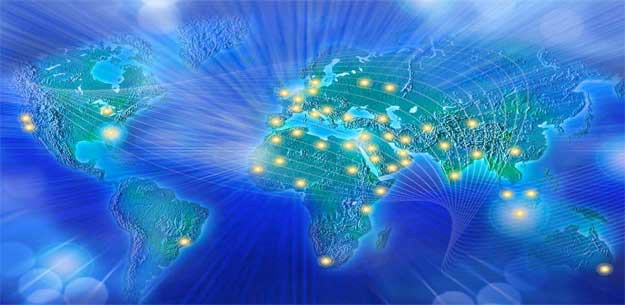THE FIVE DIFFERENT PERSPECTIVES REGARDING THE ORIGIN OF GLOBALIZATION
Many of us might confused about the different perspectives and the origin of globalization. How it is started? Or Are we really practicing this kind of concept from the past? You may asked. It was said that there are five perspectives regarding the origin of globalization.
Now, this blog will discuss and share information about the five perspectives regarding the origin of globalization. I will be using a ladder web for the five different views regarding the origin of globalization.
THE FIVE DIFFERENT PERSPECTIVES REGARDING THE ORIGIN OF GLOBALIZATION
Let’s first discuss the first perspective and origin of globalization which is hardwired.
1. HARDWIRED
According to Nayan Chanda in the year 2007 “It is because of our basic needs to make our lives better that made globalization possible”. To put it another way, globalization arose from people’s inherent desire to live a better life. There are numerous aspects we can examine in order to improve our lives as a result of globalization. In terms of economics, there are a lot of luxury products from another country that sell here in our country. Since the people are being satisfied and supply their basic needs in life, we continue to import products from the other countries. From the word itself hardwired meaning as we continue to meet our satisfaction from the products being imported, we are also building a strong connection from the other countries.
Chanda also mentioned that commerce, religions, politics and warfare are the “urges” of people toward a better life. You can ask that why is it that commerce, religions, politics and warfare are the “urges” of people toward a better life?
In commerce there is a trading system or economic system that were being introduced to the world which actually meet our satisfaction in terms to our basic needs. Religion is a source of our identity and the pride of people. In terms of politics, one country must have a government to rule and protect its people to avoid war and chaos in the country. Next is the warfare, as we can see in our modern generation every country continue to develop, improve, and adapt to the modern warfare techniques.
It was said that the commerce, religions, politics and warfare are connected to the four aspects of globalization and they can be traced all throughout the history. So what are these four aspects of globalization? These are the Trade, Missionary work, Adventures, and Conquest or known as TMAC the four aspects of globalization. So this is the first perspective regarding to the origin of globalization.
2. CYCLES
From the word itself cycle meaning it is spinning and rolling like a wheel. For some scholar, those who studied about globalization said that globalization is a long-term cyclical process. Thus, finding it’s origin will be daunting task. They said that what is important is that the cycles of globalization has gone thru. Now, it was said that there’s a cycle of globalization meaning that it will always repeat. If these ideas, things, and information will disappear then it is possible that in the future it will re-appear.
According to Scholte on the year 2005, that subscribing to this view will suggest or adhere to the idea that other global ages have appeared. Those who are part in globalization and in global ages will be disappeared and appeared in the future. There is also the notion that this point of globalization will soon disappear and reappear . Thus, if we talked about cycle in perspective in the origin of the globalization, take note to the idea of disappear and reappear. If these ideas and things is trending as of the moment maybe in the future it will disappear or it will not be the center of everyone’s interest but there’s a big possibility to reappear. So this is the second perspective in the origin of globalization which is cycles.
3. EPOCHS
It explains that there are waves of globalization that took place in past and each of them has its own origin. Cited Therborns ideas in the year 2000 the six great epoch of globalization or waves. These six great epoch of globalization has its own origin. The difference of this view from the second view which is cycles is that it does not treat epochs as returning. In the cycles perspective, the idea or part of global age will re-appear, but in epochs it does not treat as returning so it will not reappear unlike the second perspective cycles.
The following are the Therborn’s Six Great Epochs Globalization
• Globalization as religion ( fourth to seventh century)
• European colonial conquests (Late fifteenth century)
• Intra-European wars (Late eighteenth to early nineteenth centuries)
• Heyday of European imperialism (mid-nineteenth century to 1918)
• Post-World War ll period
• Post-Cold War period
After the world war 2 and the cold war period the globalization has started. Every country who is being affected from the war is slowly rising, then new ideas, technology, and techniques were shared to each other and that’s the start of globalization.
We should remember that in Epochs, the events occurred in past will not happen again. There is a possibility that world war 3 will occur but the events happened in world war 2 will not repeat.
4. EVENTS
In globalization, the specific events are also considered as part of the fourth perspective which explaining the origin of globalization. This perspective will help us to trace back the events happened and how does globalization started.
The several point can be treated as the start of globalization. Resenthal (2007) gave premium to voyages of discovery – Christopher Columbus’s discovery of America in 1942, Vasco da Gama in Cape of Good Hope in 1498, and Ferdinand Magellan’s completed circumnavigation of the globe in 1522.
In the discovery of America by Christopher Columbus started the point of globalization. After he discovered America in 1942, the idea of trade has started or the traditional way of trading started which is called barter. The sad part is during that time, Christopher Columbus has brought along with him his modern materials that the American doesn’t have on the year 1942. Since the American wants to have the materials brought by Christopher Columbus, what he did is he exchange his modern materials to the people there. Then, Christopher Columbus gained helpers and slaves since during that time having many slave can be considered powerful. That’s the origin of globalization according to the discovery of Christopher Columbus in America.
In the part of Ferdinand Magellan, his contribution was part of global age or the globalization. He introduced the Christianity here in the Philippines. The part where globalization occur is when Magellan was searching for spices (ingredients) and attempt to trade it from our country to the other country.
Now, there are some information arise that during our time can be part of the globalization since the recent years could also be regarded as the beginning of globalization with reference to specific technological advances in transportation such as airplane, ships as well as in our communication. Some examples may include first transatlantic Telephone Cable (1956), first transatlantic television broadcasts (1962), founding of modern internet (1988), and the terrorist attacks on Twin Towers in New York (2001).
As a result, we can now communicate and connect between other country to another places without going to there places, through the modern internet we can communicate easily.
Certainly with this fourth view, more and more specific events will characterize not just the origins of globalization but also more of its history.
5. BROADER, MORE RECENT CHANGES
The fifth perspective of the origin of globalization is the broader, more recent changes. These recent changes comprised with the fifth view of the origin of globalization. These broad changes happened in the last half of the 20th century.
Scholars today point to these three notable changes as the origin of globalization that we know today.
1. The emergence of the united states as the global power, our first world country which is the USA United States of America.
2. The emergence of multinational corporation. Multinational corporation in able us to have engagement of our country and other.
3. The notable changes as the origin of globalization is the demise of the Soviet Union in the end of Cold War.
The United States of America won during the ideological conflict or during cold war. Through its dominant military and economic power after world war 2, the United States was able to outrun Germany and Japan when in terms of industry and they gain global power.
The emergence of multinational corporation, the second notable changes as the origin of globalization which is the multinational corporation. Before multinational corporation came into being, the roots were from the counties of origin during the 18th and Early 19th century. The United States , Germany, the Great Britain had in their Homeland great corporation which the world knows today. However, they did not remain as far as their production and market are concerned. For example Ford in general motors originated in the United States but in the 20th they exported more automobiles and open factories to other countries. With the help of multinational corporation those transportations are being introduced to other countries.
More recent from the first two, the emergence of the United States as the global power, the emergence of multinational corporation, and the fall of the Soviet Union in 1991. These events lead to the opening of the major parts of the world for the first time since the early 20th century. After the cold war or ideological conflict between US and USSR, the downfall of Soviet Union was the time where the door of every country open again for trading. Many global process, migration, tourism, media, diplomacy and multinational corporation spread throughout the world. After the downfall of Soviet union and cold war, free world started.
It was called free world since what United States have the other countries can also have it. As the result, there is a strong connection in every country in terms of media, diplomacy, terrorism, and migration. All the ideas during the downfall of Soviet union and after cold war were introduced to the whole world. These was the reason why we transform into a modern world. This is the fifth perspective regarding of the origin of globalization. Globalization is all about having freedom and communication with other country.
Through this blog, you can gain knowledge regarding the perspectives, history and origin of globalization. The term globalization is not fresh to us, we’ve been practicing these kind of concept back then up until now but some of us didn’t know the five different perspectives and the origin of globalization. Hoping that this blog gives you more insight and information about the five different perspectives and the origin of globalization. Thank you for reading.





Comments
Post a Comment